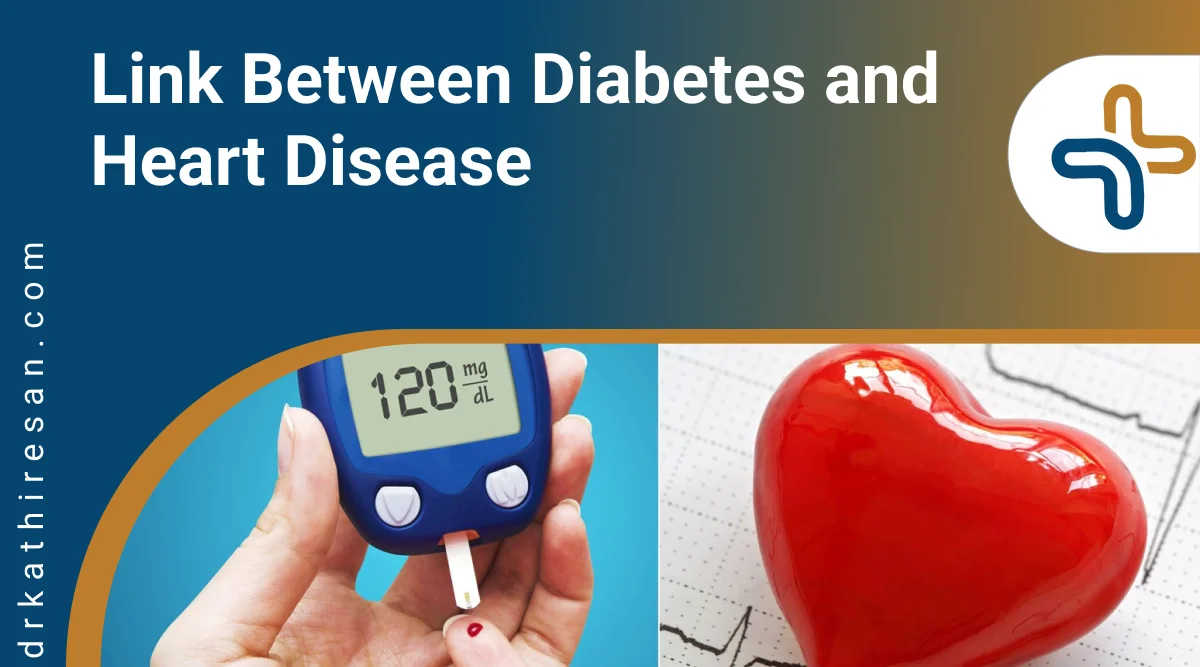The intricate relationship between diabetes and heart disease is a topic of increasing importance in the realm of healthcare. This blog post aims to delve into the various facets of the Link Between Diabetes and Heart Disease, shedding light on the connection, risks, and preventive measures that individuals can take to maintain their cardiovascular health.
Exploring the Link Between Diabetes and Heart Disease
The Link between diabetes and cardiovascular disease is a critical aspect of overall health, marked by several key points that emphasize the significant link between diabetes and heart disease:
Shared Risk Factors:
- Interconnected Risks: Diabetes and cardiovascular disease often share common risk factors, such as obesity, high blood pressure, and abnormal cholesterol levels. These factors increase the likelihood of developing heart-related complications in individuals with diabetes.
Impact of Diabetes on the Heart:
- Heightened Risks: Diabetes can significantly increase the risk of developing cardiovascular issues, including heart attacks, stroke, and heart failure. It affects the heart’s blood vessels, making them more prone to damage and narrowing, leading to complications.
Importance of Vigilance:
- Heightened Awareness: Individuals with diabetes should remain vigilant about their heart health, as they have an elevated risk of experiencing heart-related complications. Regular medical check-ups and monitoring are crucial for early detection and intervention.
Understanding this intricate link between diabetes and heart disease underscores the importance of proactive measures in managing diabetes and maintaining cardiovascular health.
Recognizing Diabetic Heart Attack Symptoms
Diabetic individuals may experience distinct or subtle symptoms during a heart attack, necessitating awareness and prompt action:
Atypical Symptoms:
- Less Typical Signs: Diabetic heart attack symptoms may manifest differently. Some individuals may not experience the classic chest pain commonly associated with heart attacks.
- Subtle Indications: Symptoms such as extreme fatigue, shortness of breath, nausea, or discomfort in the neck, jaw, back, or arms could signal a heart attack in diabetic individuals.
Importance of Vigilance:
- Swift Response: Recognizing these subtle symptoms is crucial, as delayed recognition could lead to delayed medical intervention during a heart attack.
- Seeking Immediate Help: Any suspicion of a heart attack, even if symptoms seem less typical, warrants immediate medical attention to mitigate potential complications.
Awareness of these atypical symptoms is vital for diabetic individuals to seek timely medical care and potentially avert serious consequences during a heart attack.
Navigating Diabetic Heart Failure
Diabetes can significantly impact heart function, leading to heart failure and posing specific challenges:
Heart Function Impairment:
- Impact of Diabetes: Diabetes can weaken the heart muscle over time, impairing its ability to pump blood effectively, eventually leading to heart failure.
- Risk Management: Diabetic individuals must manage blood sugar levels diligently to reduce the risk of heart failure.
Preventive Measures:
- Lifestyle Management: Adopting a heart-healthy lifestyle, including a balanced diet, regular exercise, and stress management, plays a crucial role in preventing diabetic heart failure.
- Medical Monitoring: Regular medical check-ups and adherence to prescribed medications are essential in managing diabetes and reducing the risk of heart failure.
Healthcare Support:
- Medical Guidance: Seek guidance from healthcare providers to monitor heart health closely, as proactive management of diabetes is vital in preventing diabetic heart failure.
Understanding the risks and actively managing diabetes can significantly contribute to reducing the likelihood of heart failure in diabetic individuals.
Proactive Measures for Cardiovascular Health in Diabetes
- Balanced Lifestyle Choices: Adopting a heart-healthy lifestyle, including regular exercise, a balanced diet, and stress management, plays a pivotal role in managing the link between diabetes and heart disease.
- Medication Adherence: Strict adherence to diabetes medications and careful monitoring of blood glucose levels contribute to overall cardiovascular health.
- Regular Check-ups: Routine medical check-ups allow healthcare professionals to assess and manage diabetes-related cardiovascular risks effectively.
Conclusion
In conclusion, the Link Between Diabetes and Heart Disease is undeniable, emphasizing the importance of proactive measures in managing both conditions. Understanding the risk of heart failure, and adopting a heart-healthy lifestyle are essential steps in mitigating these risks. As we navigate this intricate relationship, we invite you to share your thoughts, experiences, or questions in the comments below. Your input can contribute to a community of shared knowledge and support.
Call to Action
Your engagement is vital! Share your insights or questions about the link between diabetes and heart disease in the comments. Let’s foster a community that promotes awareness and well-being.


